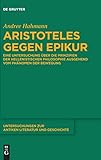Aristoteles gegen Epikur : Eine Untersuchung über die Prinzipien der hellenistischen Philosophie ausgehend vom Phänomen der Bewegung / Andree Hahmann.
Material type: TextSeries: Untersuchungen zur antiken Literatur und Geschichte ; 125Publisher: Berlin ; Boston : De Gruyter, [2017]Copyright date: ©2017Description: 1 online resource (XII, 472 p.)Content type:
TextSeries: Untersuchungen zur antiken Literatur und Geschichte ; 125Publisher: Berlin ; Boston : De Gruyter, [2017]Copyright date: ©2017Description: 1 online resource (XII, 472 p.)Content type: - 9783110500257
- 9783110498080
- 9783110499209
- 100
- B171 .H346 2017
- online - DeGruyter
- Issued also in print.
| Item type | Current library | Call number | URL | Status | Notes | Barcode | |
|---|---|---|---|---|---|---|---|
 eBook
eBook
|
Biblioteca "Angelicum" Pont. Univ. S.Tommaso d'Aquino Nuvola online | online - DeGruyter (Browse shelf(Opens below)) | Online access | Not for loan (Accesso limitato) | Accesso per gli utenti autorizzati / Access for authorized users | (dgr)9783110499209 |
Browsing Biblioteca "Angelicum" Pont. Univ. S.Tommaso d'Aquino shelves, Shelving location: Nuvola online Close shelf browser (Hides shelf browser)

|

|

|

|

|

|

|
||
| online - DeGruyter Conrad Gessner (1516-1565) : Die Renaissance der Wissenschaften/The Renaissance of Learning / | online - DeGruyter Funktionen des Lebendigen / | online - DeGruyter Digilect : The Impact of Infocommunication Technology on Language / | online - DeGruyter Aristoteles gegen Epikur : Eine Untersuchung über die Prinzipien der hellenistischen Philosophie ausgehend vom Phänomen der Bewegung / | online - DeGruyter Antike als Transformation : Konzepte zur Beschreibung kulturellen Wandels / | online - DeGruyter Lebenssinn und Erbe / | online - DeGruyter Speyer als Hauptstadt des Reiches : Politik und Justiz zwischen Reich und Territorium im 16. und 17. Jahrhundert / |
Frontmatter -- Vorwort -- Inhalt -- Einleitung -- Kapitel I – Form und Materie in der Wahrnehmung -- Kapitel II – Die Atome, das Leere und die atomaren Bilder -- Kapitel III – Naturabsicht und Selbsterhaltung -- Kapitel IV – Das Feuer der Wahrnehmung -- Kapitel V – Vorsehung, Zufall und Theodizee -- Ergebnis -- Anhang: Ist Kant der bessere Stoiker? -- Verzeichnis der verwendeten Siglen -- Glossar -- Literaturverzeichnis -- Sachregister -- Personenregister
restricted access online access with authorization star
http://purl.org/coar/access_right/c_16ec
Die Zurückweisung, mit der viele frühneuzeitliche Autoren der aristotelischen Naturphilosophie begegnen, geht häufig mit einer emphatischen Aufnahme der hellenistischen Philosophie einher. Vor diesem Hintergrund fragt die vorliegende Untersuchung nach den prinzipiellen Unterschieden zwischen Aristoteles und seinen hellenistischen Nachfolgern. Ausgangspunkt ist die für die aristotelische Philosophie zentrale Analyse des Phänomens der Bewegung.
It is well known that Early Modern philosophers rejected Aristotelian philosophy of nature. At the same time, they passionately embraced the major Hellenistic schools of philosophy. The study takes this fact as a point of departure to explain the fundamental differences between Aristotle and his Hellenistic successors. At the heart of the investigation lies Aristotle’s discussion of motion, which is essential for many Aristotelian conceptions.
Issued also in print.
Mode of access: Internet via World Wide Web.
In German.
Description based on online resource; title from PDF title page (publisher's Web site, viewed 28. Feb 2023)


